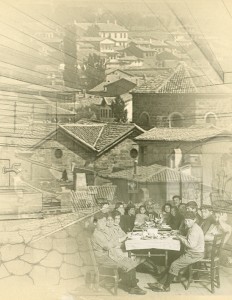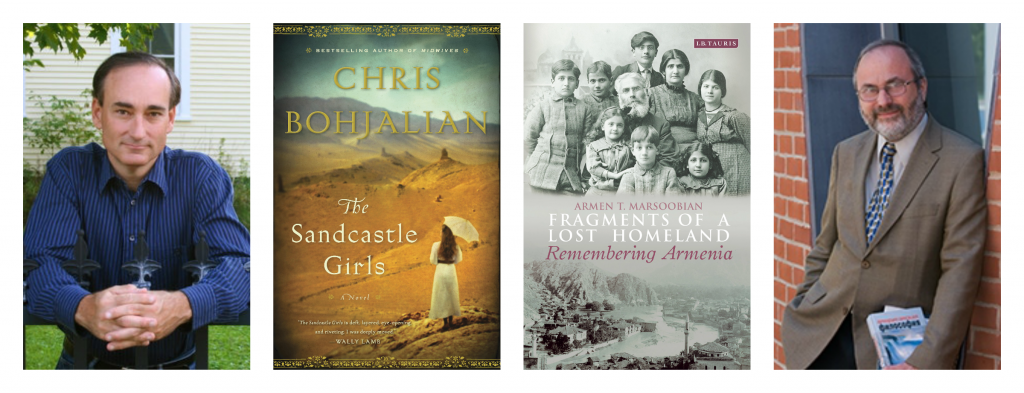 Date: Tuesday, March 24, 2015 at 6:00PM
Date: Tuesday, March 24, 2015 at 6:00PM
Location: Thomas J. Dodd Research Center, 405 Babbidge Rd, Storrs, CT.
Get directions.
Agenda:
6:00-6:45 pm Reception
6:45-7:45 pm Discussion
7:45-8:00 pm Q&A
8:00-8:30 pm Book Signing
A conversation with:
Chris Bohjalian, Author, The Sandcastle Girls
Armen T. Marsoobian, Professor & Chair of Philosophy, Southern Connecticut State University
Moderated by:
Dr. Daniel Adler, Associate Professor of Anthropology, University of Connecticut
Chris Bohjalian is the author of 17 books, including ten New York Times bestsellers. His work has been translated into roughly 30 languages and three times become movies. His books have been chosen as Best Books of the Year by the Washington Post, the St. Louis Post-Dispatch, the Hartford Courant, the Milwaukee Journal-Sentinel, Publishers Weekly, Library Journal, Kirkus Reviews, Bookpage, and Salon.
His awards include the ANCA Freedom Award for his work educating Americans about the Armenian Genocide; the ANCA Arts and Letters Award for The Sandcastle Girls, as well as the Saint Mesrob Mashdots Medal; the New England Society Book Award for The Night Strangers; the New England Book Award; Russia’s Soglasie (Concord) Award for The Sandcastle Girls; a Boston Public Library Literary Light; a finalist for the Lambda Literary Award for Trans-Sister Radio; and the Anahid Literary Award. His novel, Midwives, was a number one New York Times bestseller, a selection of Oprah’s Book Club, and a New England Booksellers Association Discovery pick. He is a Fellow of the Vermont Academy of Arts and Sciences.
He has written for a wide variety of magazines and newspapers, including the Washington Post, Cosmopolitan, Reader’s Digest, and the Boston Globe Sunday Magazine. He has been a weekly columnist in Vermont for the Burlington Free Press since February 1992.
Chris graduated Phi Beta Kappa and Summa Cum Laude from Amherst College, and lives in Vermont with his wife, the photographer Victoria Blewer. Their daughter, Grace Experience, is a young actor in New York City. Among the audiobooks she has narrated is Close Your Eyes, Hold Hands.
The Sandcastle Girls. This spellbinding tale travels between Aleppo, Syria in 1915 and Bronxville, New York in 2012—a sweeping historical love story steeped in the author’s Armenian heritage, making it his most personal novel to date.When Elizabeth Endicott arrives in Syria she has a diploma from Mount Holyoke College, a crash course in nursing, and only the most basic grasp of the Armenian language. The First World War is spreading across Europe and she has volunteered on behalf of the Boston-based Friends of Armenia to deliver food and medical aid to refugees of the Armenian Genocide. There Elizabeth becomes friendly with Armen, a young Armenian engineer who has already lost his wife and infant daughter. When Armen leaves Aleppo to join the British army in Egypt, he begins to write Elizabeth letters, and comes to realize that he has fallen in love with the wealthy, young American woman who is so different from the wife he lost. Flash forward to the present, where we meet Laura Petrosian, a novelist living in suburban New York. Although her grandparents’ ornate Pelham home was affectionately nicknamed “The Ottoman Annex,” Laura has never really given her Armenian heritage much thought. But when an old friend calls claiming to have seen a newspaper photo of Laura’s grandmother promoting an exhibit at a Boston museum, Laura embarks on a journey back through her family’s history that reveals love, loss – and a wrenching secret that has been buried for generations.
Armen T. Marsoobian is Professor and Chairperson of Philosophy at Southern Connecticut State University in New Haven. He has twice served as the Ordjanian Visiting Professor in Armenian Studies, Department of Middle East, South Asian, and African Studies, at Columbia University. He received his Ph.D. from the State University of New York at Stony Brook. He is editor in chief of the Wiley-Blackwell philosophy journal Metaphilosophy. He teaches a variety of courses in Philosophy and in the Honors College, including advanced courses in American philosophy, aesthetics, moral philosophy and genocide studies. He has co-edited five books, including: Genocide’s Aftermath: Responsibility and Repair; The Philosophical Challenge of September 11; and The Blackwell Guide to American Philosophy. He has published articles and book chapters in aesthetics, moral philosophy, genocide studies and American philosophy. He won the Hrant Dink Prize for Historical Research in 2011 for his work on the Armenian Genocide. He has lectured widely on topics related to genocide, including reparations, reconciliation and memorialization. His graduate seminars at Columbia University have explored the Armenian Genocide through literature and art. His most recent book is a bilingual (Turkish-English) photography book based upon his family’s Ottoman era photography collection and an illustrated history of his family entitled, Fragments of a Lost Homeland: Remembering Armenia, released by I. B. Tauris Publishers. A Turkish version of this book will soon be released. He has organized exhibitions based upon the Dildilian family photography collection in Istanbul, Merzifon, and Diyarbakir. Further exhibitions are planned for Ankara, London, Paris, Yerevan and the United States.
Fragments of a Lost Homeland. The Armenian world was shattered by the 1915 genocide. Not only were thousands of lives lost but families were displaced and the narrative threads that connected them to their own past and homelands were forever severed. Many Armenians have been left with only fragments of their family histories: a story of survival passed on by a grandparent who made it through the cataclysm or, if lucky, an old photograph of a distant, yet silent, ancestor.
By contrast the Dildilian family, the ancestors of Armen T. Marsoobian, chose to speak. Two generations of storytellers gave voice to their experience in audio and video recordings, in lengthy written memoirs, in diaries and letters, and most unusually in photographs and drawings. Their story covers a 50-year time span that encompasses three pivotal and often violent moments in Armenian and Ottoman history: the period leading up to the Hamidian Massacres of 1894-96; the 1915 and 1916 deportation and killings of the Ottoman Armenians, during which the Dildilian family rescued and hid dozens of young Armenian men and women; and the massacres and final expulsion of the surviving Armenian population during the Turkish War for Independence of 1919-23 – an often-overlooked, but no less integral, part of the Armenian story.Here, in Fragments of a Lost Homeland, Marsoobian uses a unique array of family sources to tell the story of his ancestors and, in doing so, brings to life the tumultuous events of the early twentieth century.
